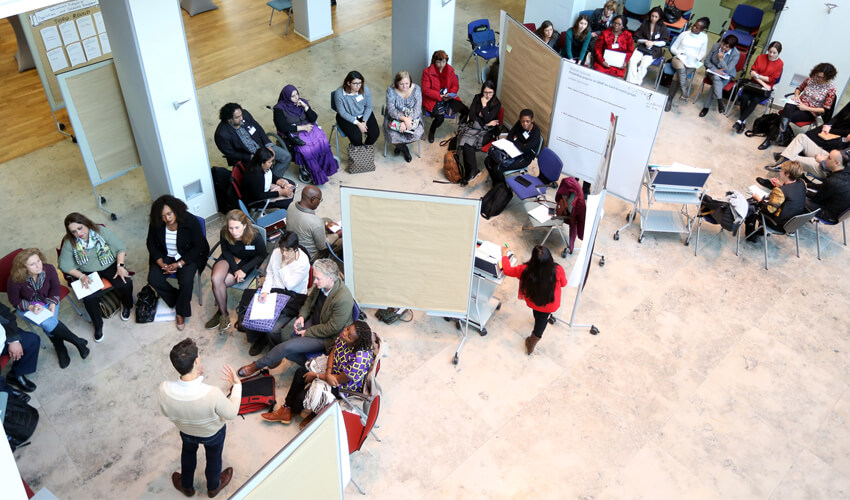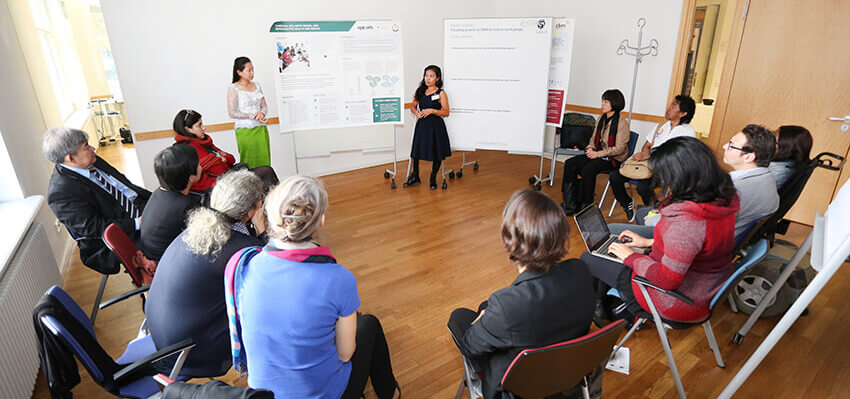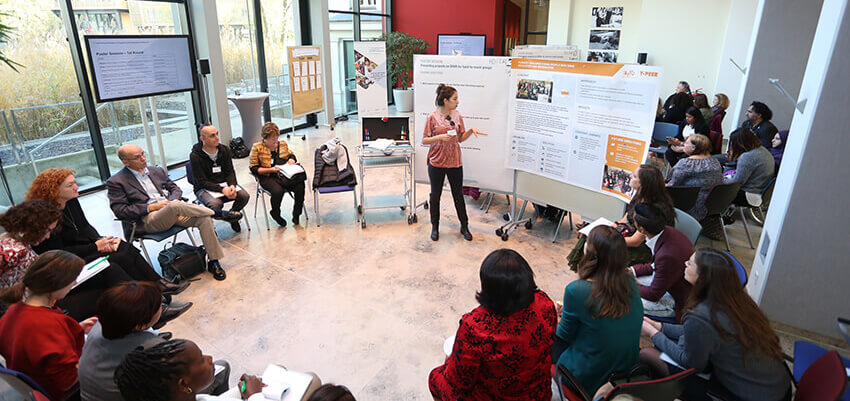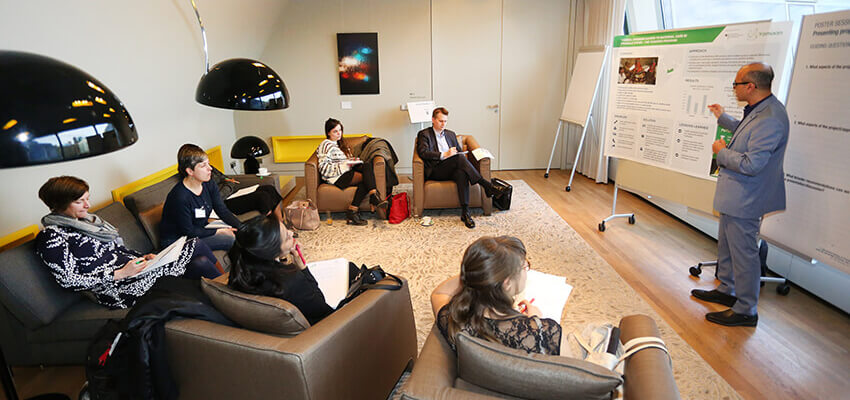Poster Sessions

Global Projects on SRHR for Hard-to-Reach Groups
Delegates at the International Dialogue are experts themselves, and given a lot of time to share ideas and discuss strategies in small groups. This year, posters from SRHR initiatives were prepared ahead of time and presented by people working within those projects. Here, the facilitated discussions from projects based in Cambodia, Turkey and Yemen will be examined more closely.
Find the link to all the posters here.
Cambodia: Inclusive Sexual and Reproductive Health and Rights
This session was presented by Kunthy Ok from the Kampot Provincial Health Department in southern Cambodia, and Sokny Onn, the Co-Director of Epic Arts, an inclusive arts organisation supported by GIZ Cambodia, among others. Ten percent of Cambodia’s nearly 16 million people live with disabilities. But, while persons with disabilities have the same rights as all other Cambodians, they have trouble accessing these, particularly in the area of health care, and sexual and reproductive health and rights.

“We face the same problems as others around the world,” Ok explained. “People with disabilities are isolated, without full access to health care and services. Women face more discrimination than men and find their isolation worsens as they get older, because they cannot find partners and end up with no family.” The solutions they prefer involved continued awareness-raising in communities and training for health providers on how to serve and communicate with persons with disabilities.
Creative approaches are at the core of Epic Arts’ community work. They are a team of performers and artists, including dancers with disabilities, who create shows, films and artwork to promote health and awareness about disability. In addition, they offer direct training and train-the-trainer programs, and liaise directly with government.
“Performing helps us develop confidence,” Onn told the group gathered at her presentation. “Saying we can do it, showing we can do and knowing we have the right is so important.” Epic Arts’ short film ‘Safe Love’ has had more than 80 thousand views online so far, and the group conducts popular social media campaigns because they see digital information distribution as one of their most powerful tools.
Delegates thought the film was an excellent tool for reaching a wide audience and applauded the creative approach taken by Epic Arts. They were invited to offer ideas to amplify and improve the work, and suggested more targeted interventions for specific issues affecting persons with disabilities and clearer commitments to working on gender based violence.
Turkey: Reaching Young People with SRHR Education
Youth Approaches to Health Association (YAHA) was founded in July 2015 by a group of young women in Turkey and focuses mainly on SRHR, gender issues and human rights. Their work was presented by board member Cansu Tasdemir, who explained that recognising young people as sexually active has proven to be a huge challenge in her work.

“When young people go to the hospital, and are not married, health professionals don’t see them as sexually active, they refuse to do pap smears or HIV testing. This is supported by the government which regards young people as sexually inactive and therefore without any need for SRHR education or services.”
YAHA focuses on peer education in order to circumvent power structures that prevent young people from learning about their bodies. They train peer educators, provide free condoms, and have developed tools like games, which include information about HIV and AIDS. The internet, on the other hand, has not always offered Turkish youth the information they need, Tasdemir explained. “Many learn about SRHR through the internet, where there are a lot of mistakes and discriminatory language, especially for HIV and AIDS.”
Turkey had youth friendly health services ten years ago, but these were shuttered by the government. YAHA has helped open several HIV testing centres, but the stigma has created a situation where people are not getting care early enough. Adding to this burden is that LGBTQI groups are banned.
Yemen: Ensuring Access to Maternal Care in Fragile States
In 2011, the Arab Spring arrived in Yemen. 2014 brought renewed turmoil and political conflict. Today, militant groups and oppressive, dangerous circumstances complicate every aspect of survival in Yemen. This is the political landscape upon which Yamaan Foundation provides family planning and SRHR services, with a focus on reaching women in remote areas.

“Health workers are working without pay, people in remote areas are without facilities and have no money or fuel to reach urban health providers,” Yamaan founder Ashraf Badr told delegates.
Supported by the German Federal Ministry for Economic Cooperation and Development (BMZ), Yamaan has developed a voucher project intended to foster better conditions for safe motherhood. This program provides for travel and accommodation and works to remove barriers to health care services. The voucher program enables even the poorest women to access private services, and this provides the private sector with increased incentive to deliver more services into more remote areas.
“Fraud is a risk factor with this program,” Badr warned. “If facilities don’t meet requirements or fraud has occurred, the provider is pushed out. The woman who uses the voucher can use a call centre number to get support when drivers fail to show up, or when they have questions about health services.
The program has not been popular with everyone. Some would like to see development funds used to help people who are wounded, or develop businesses, not support family planning. Nevertheless, they have good international support as well as ongoing collaboration with UNICEF, KFW and GIZ. “We do all we can connect with good health care providers, prevent infection, support safe motherhood and family planning,” Badr said. “We work to empower women, but sustainability in a context as fragile as this remains a dream.”